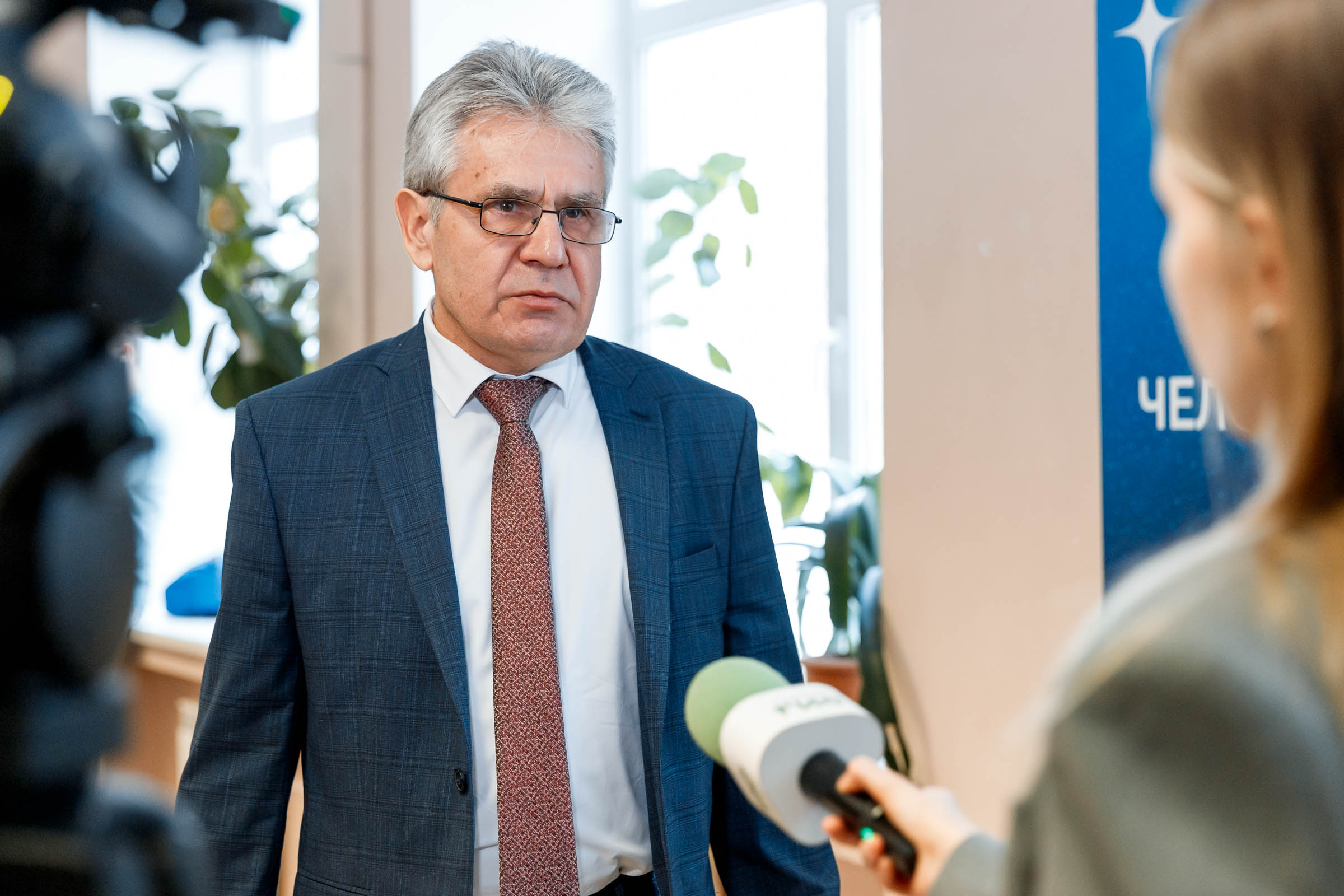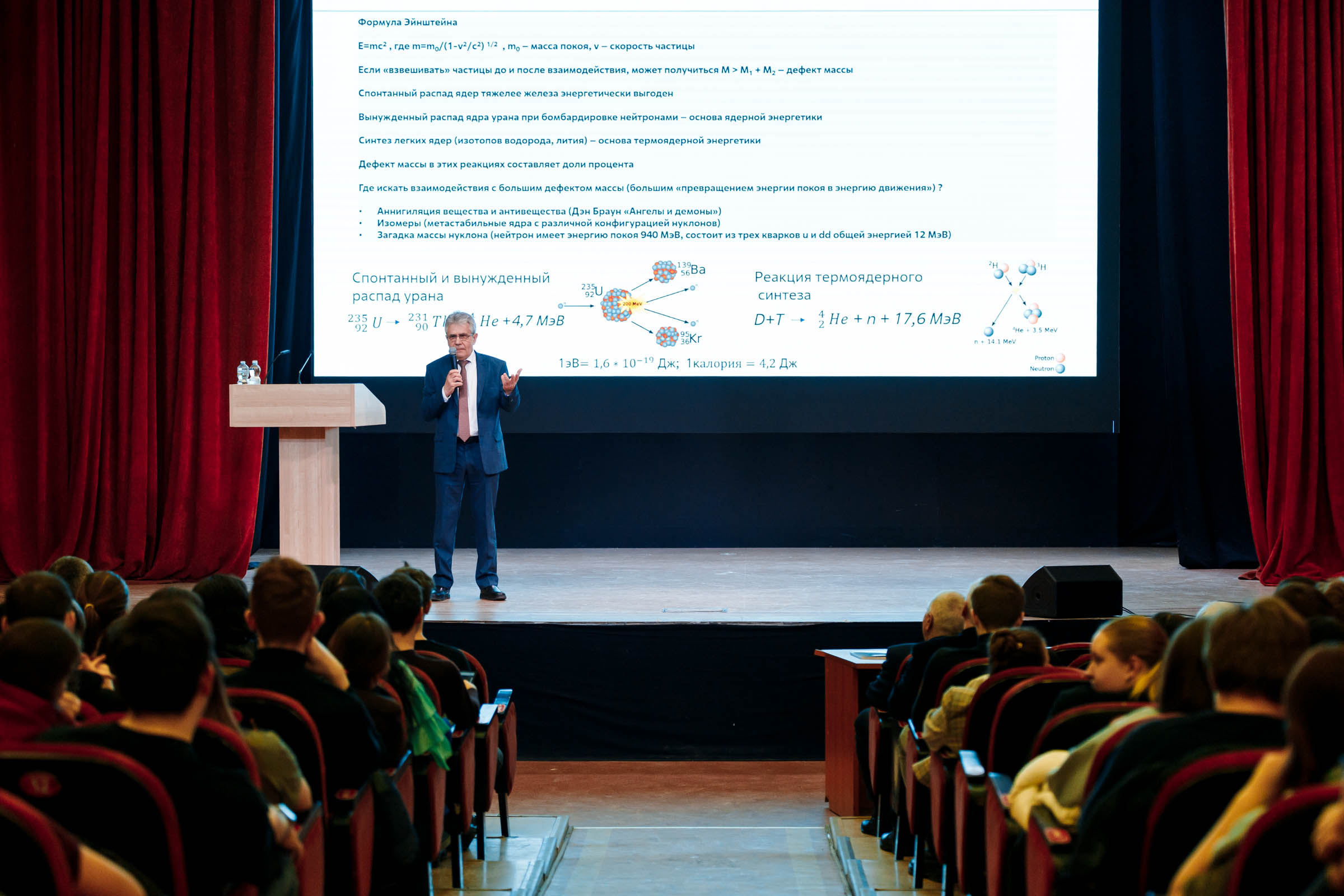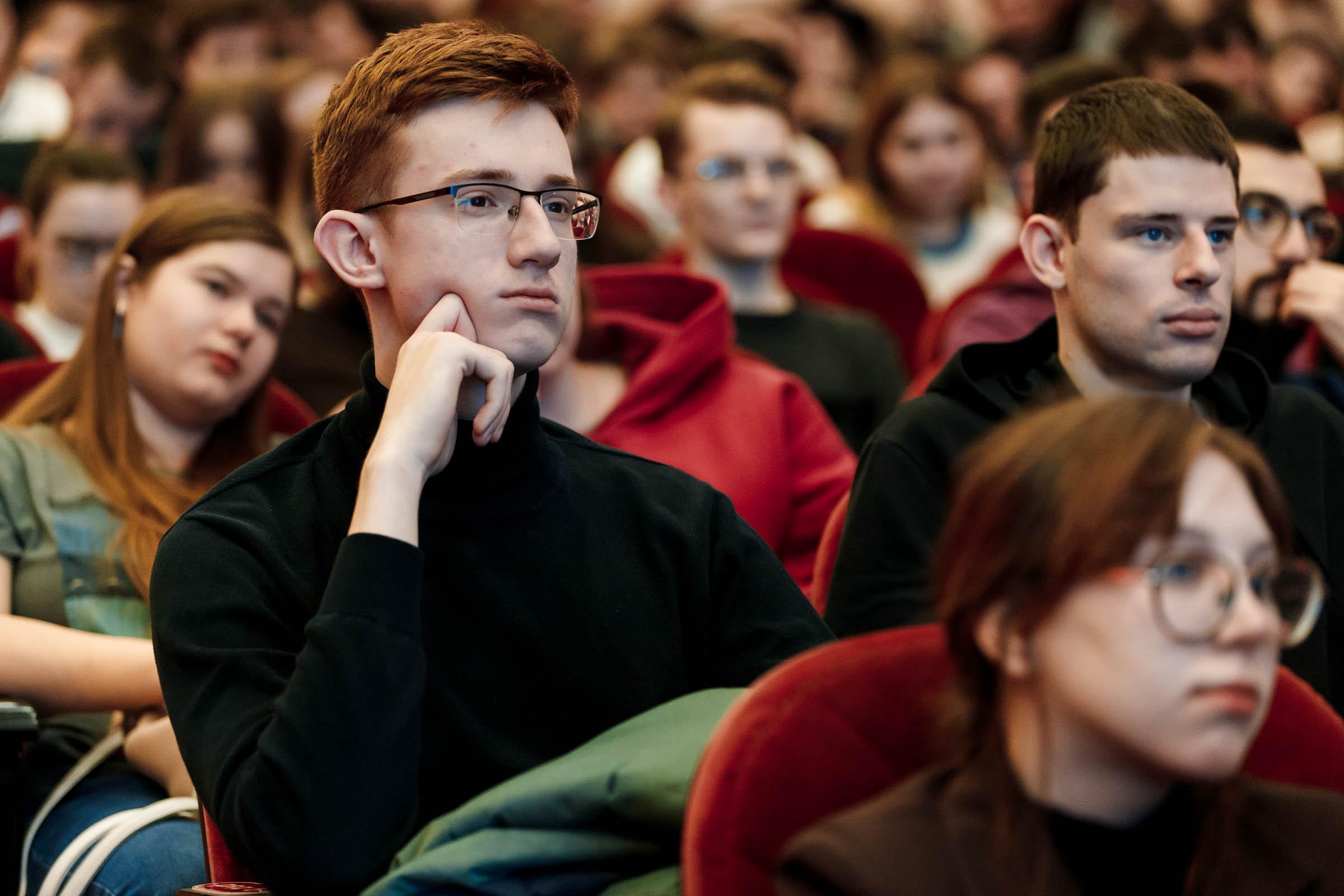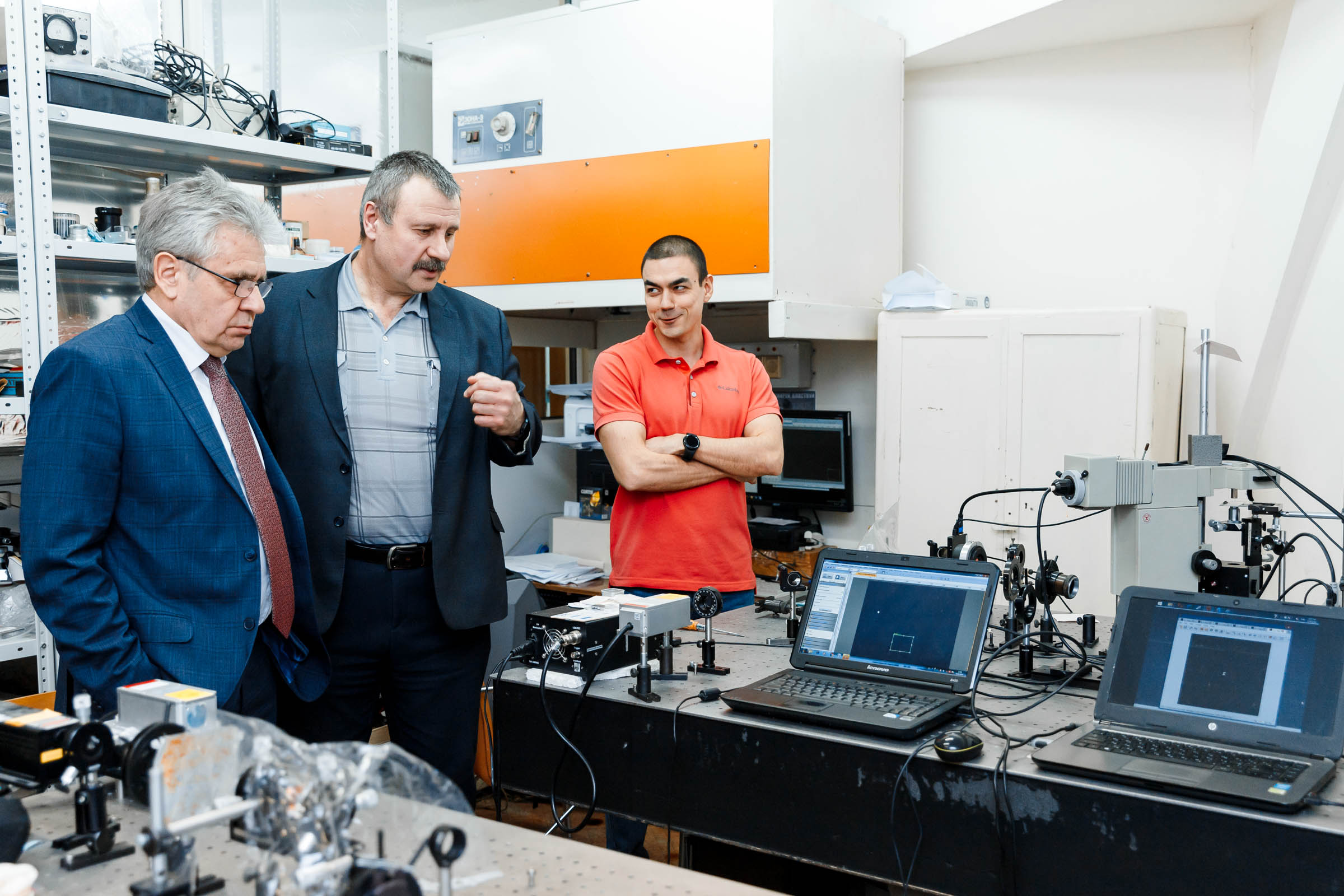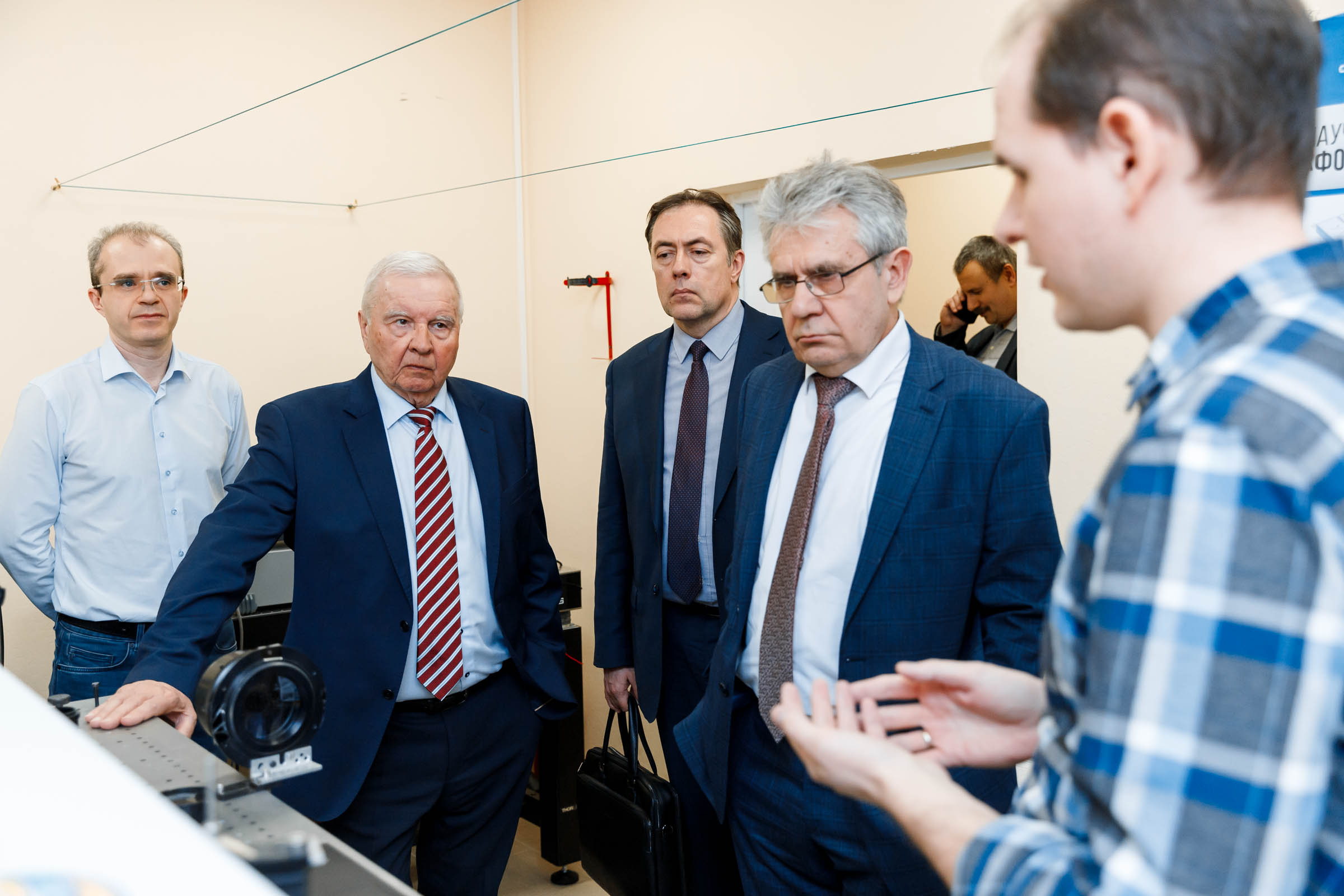Joint projects
During the visit to the University, Aleksandr Sergeev held a working meeting with the President of the University, Member of the Russian Academy of Sciences Viktor Soyfer and Rector Vladimir Bogatyrev, at which issues of the implementation of scientific and technological projects within the framework of the scientific program of the NCPhM were raised.
Applied physicists and mathematicians are expected in Sarov
During the lecture, Aleksandr Sergeev told the students about the history of the creation of the National Center for Physics and Mathematics in Sarov, Nizhny Novgorod Region. The NCPhM appeared at the end of 2020 – then President Vladimir Putin was presented with the project of a new modern scientific center. “In fact, we proposed to create a 21st-century Academic Town in Sarov, which will be located next to the country's nuclear shield and combine fundamental and applied science. It will be interesting for both leading and young scientists, as well as our colleagues from abroad, to come here to work," the speaker explained. "At NCPhM, we are creating new unique experimental facilities that will allow scientists to solve the most complex open issues of science and technology.” Among such installations are megascience-class complexes being created as part of the NCPhM scientific program: this is a multifunctional accelerator complex for studying matter at the nucleon level, a center for research on extreme light fields, in which scientists plan to “destroy the vacuum and see what the microcosm consists of at the deepest level,” and a photonic computer for ultrafast computing – they are planned to be built by 2030.
A team led by the President of Samara University, Member of the Russian Academy of Sciences Viktor Soyfer is involved in the project to create a photonic computer. “The result of the work of Viktor Aleksandrovich’s colleagues on the creation of a unique analog photonic processor is one of the best achieved within the framework of the NCPhM scientific program in 2023. The future belongs to analog specialized photonic devices, because a universal digital processor consistently performs a number of operations, but it will not solve a huge matrix in a reasonable time, even in a year. There is a more understandable procedure for multiplying matrices by spreading light through phase screens, and this is being done at your university – you have the world's leading analog signal processing center. I invite you to take up these tasks,” the NCPhM scientific director addressed the students.
Especially in Sarov, graduates of bachelor’s and master's degrees in the field of applied physics and applied mathematics, as well as in the field of IT are expected. “Graduates of Samara University is extremely in demand by the country's industrial enterprises. New personnel are required to solve problems related to ensuring Russia’s technological sovereignty, the development of high-tech industries, and the development of new fundamental physics. And at the Samara University prepares such personnel,” Aleksandr Sergeev stressed.
Roman Skidanov, Professor of the Department of Technical Cybernetics at Samara University, also spoke to the students, and in his report “Optical analog computing”, he told about the features of creating an analog photonic processor with a performance close to a world record in the framework of the NCPhM scientific program: “We have been cooperating with NCPhM for a long time and are engaged in the development of analog photonic computers. Why analog and not digital ones? It is known that in digital photonic structures, the signal fades quickly and in the near future there will be no practical possibility of amplifying a digital photonic signal, so we began to develop analog computing. Today, we can implement the classical method of information processing in analog photonic devices. Analog computers are indispensable in applications where analog processing has been and always will be dominant, for example, in image recognition tasks. The information processing speed in the analog photonic processor, which we are implementing as part of the NCPhM scientific program, is close to a world record, the reliability of the system in new experiments was about 98%. We urge all students to join our work, we are sorely short of staff.”
Academic base
Then Member of the Russian Academy of Sciences Aleksandr Sergeev met with employees of the department of the Kurchatov Institute Research Center – the Institute of Image Processing Systems, as well as the Institute of Informatics and Cybernetics of Samara University. Here, the NCPhM scientific director was presented with developments in the field of nanophotonics, computer optics and image processing.
Nikolai Kazansky, Professor of the Department of Technical Cybernetics, briefly spoke about the main scientific directions and the history of the team. Vladimir Paveliev, Head of the Department of Nanoengineering, presented the results of research in the field of terahertz optics and logical optical elements of a photonic computer, and then answered Academician Sergeev's questions about the work on digital photonics. Leonid Doskolovich, Professor of the Department of Technical Cybernetics, in his report informed on the achievements in the creation of diffraction neural networks.
Roman Skidanov elaborated on what has already been done and what is planned to be done as part of a joint project with the NCPhM to create analog photonic computers and optical computing accelerators. He also spoke about the development and flight tests of compact hyperspectral equipment on the 3U ISOI SXC3-219 cubesat, launched in 2023 under the Space-Pi program.
Aleksandr Sergeev saw the material equipment of the laboratories and received answers to his questions during direct communication with the project executors.
For reference:
The National Centre for Physics and Mathematics (NCPhM) is a flagship project of the Decade of Science and Technology. In Sarov, a complex of research buildings, advanced laboratories and equipment of Midiscience and Megascience Classes is being built in the territory of the NCPhM, for the purpose of obtaining new world-class scientific results, training high-quality scientists, educating new scientific and technological leaders, strengthening the human-resources potential of the Rosatom State Corporation enterprises and key scientific organizations in Russia.
Leading physicists and mathematicians present ambitious scientific and technological projects to students and young scientists as part of a series of field meetings "Time of Science" with the support of Rosatom State Corporation, the National Center for Physics and Mathematics, Sarov Moscow State University and RFNC-VNIIEF within the framework of the Decade of Science and Technology. A series of events started at the Samara National Research University. They are held in order to develop continuous training of highly qualified scientific and engineering personnel, as well as effective interaction between the state, educational organizations and business to solve the problems of technological sovereignty of Russia and the implementation of the initiatives of the Decade of Science and Technology.
Photo: Olesya Orina

